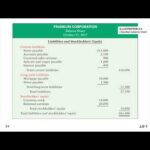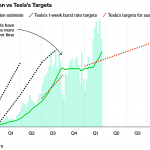
Most of these superseded FRSs were withdrawn for reporting periods starting on or after 1 January 2015, with the exception of the Financial Reporting Standard for Smaller Entities (FRSSE), which was withdrawn as of 1 January 2016. Where a new standard is to be proposed, a Financial Reporting Exposure Draft (FRED) is released for taxpayer identification numbers comment. The standard in final form is only issued when comments have been incorporated or addressed. This aims to address the criticisms levelled at the ASC, whose comment process was less rigorous.
Superseded Staff Education Notes
A new financial reporting framework came into effect in the UK on 1 January 2015. FRS 105 is the UK accounting standard for entities eligible for, and who choose to apply, the micro-entities regime. A listing of the superseded standards and statements which have been withdrawn and replaced by FRS 100 to FRS 105. UK companies with a presence in an EEA country – for example, a branch – need to check the reporting requirements in that country. There have been changes to the UK’s corporate reporting regime which affect a small number of companies. Find out more about your career prospects from studying accounting and finance.
Advertise with ICAEW
Generally Accepted Accounting Practice in the UK, or UK GAAP or GAAP (UK), is the overall body of regulation establishing how company accounts must be prepared in the United Kingdom. Company accounts must also be prepared in accordance with applicable company law (for UK companies, the Companies Act 2006; for companies in the Channel Islands and the Isle of Man, companies law applicable to those jurisdictions). The Audit Directive requirement still applies to companies with a parent company incorporated in the UK.
The FRC develop and maintain UK and Irish accounting standards by developing and issuing accounting standards and undertaking outreach with stakeholders. Entry requirements differ between university and course, but this should give you a guide to what is usually expected from accounting and finance applicants. Whether ensuring regulatory compliance, conducting financial audits, or crafting investment strategies, accounting and finance offers a great opportunity for those looking for a rewarding career in the financial sector.

Recommendations on Accounting Principles
The Library collection includes a large number of such publications, including many articles and books. To search the full range of available material, please use the Library catalogue (LibCat). Copies of older FREDs, and other discussion papers, are held in the Library collection and can be viewed by arrangement. We maintain a dedicated research guide on SORPs, which provides an overview of SORPs and their history, together with information on how to obtain current and withdrawn SORPs. Information on SORPs and where to find them can also be accessed via asset disposals report our ‘Accounting for specific sectors’ page, as well as on the FRC website. SORPs are issued by a number of industry and sector bodies which are recognised by the FRC as SORP-making bodies.
- There have been changes to the UK’s corporate reporting regime which affect a small number of companies.
- FRS 100 Application of Financial Reporting Requirements sets out the financial reporting regime for the UK and Republic of Ireland.
- From this hub you can find a synopsis of each standard and details of recent amendments.
- Generally Accepted Accounting Practice in the UK, or UK GAAP or GAAP (UK), is the overall body of regulation establishing how company accounts must be prepared in the United Kingdom.
UK GAAP vs. IFRS
How companies incorporated in the UK, or where the parent company is incorporated in the UK, can comply with UK accounting and reporting requirements. In 2004, the Government took the decision to strengthen the regulatory system in the UK following the major corporate collapses in the US. This led to the FRC’s role being extended, with the Council becoming the single independent regulator of the accounting and auditing profession, as well as being responsible for issuing accounting standards and dealing with their enforcement. The acronym GAAP stands for ‘Generally Accepted Accounting Practice’ — or, alternatively, ‘Generally Accepted Accounting Principles’ or ‘Generally Accepted Accounting Policies’. GAAP is a term used to describe the rules generally accepted as being applicable to accounting practices as laid down by standards, legislation or upheld by the accounting profession.
You could be at the heart of financial decision-making, contributing to the financial health of organisations and influencing business growth. All financial accounting information and values regarding a business’s financial position must be disclosed in the records. A financial accounting entry should be allocated to a given period, and if it covers multiple periods, it should be divided accordingly. For example, when a customer prepays a subscription (or lease, etc.), the revenue should be divided over all the time and not entirely counted on the date of transaction.
More information on each of these, plus additional guidance and resources, can be accessed via ICAEW’s UK GAAP hub page. Impact assessments and feedback statements have been issued alongside the relevant standard or amendment to a standard. On 13 December 2018 the FRC issued a suite of staff factsheets on aspects of FRS 102, including the 2017 triennial review. The factsheets are intended to assist stakeholders by highlighting certain requirements of what are the formulas of cos FRS 102. For subsidiaries that are issuers of securities on UK regulated markets, the parent company may be subject either to the FCA or the PRA rules. They can use EU-adopted IAS for accounting periods starting before January 2021.
FRS 100 Application of Financial Reporting Requirements sets out the financial reporting regime for the UK and Republic of Ireland. FRS 105 is intended for use in the preparation of the financial statements of companies that qualify for the micro-entities regime. FRS 104 is intended for use in the preparation of interim reports by entities that apply FRS 102 The Financial Reporting Standard applicable in the UK and Republic of Ireland when preparing their annual financial statements.
